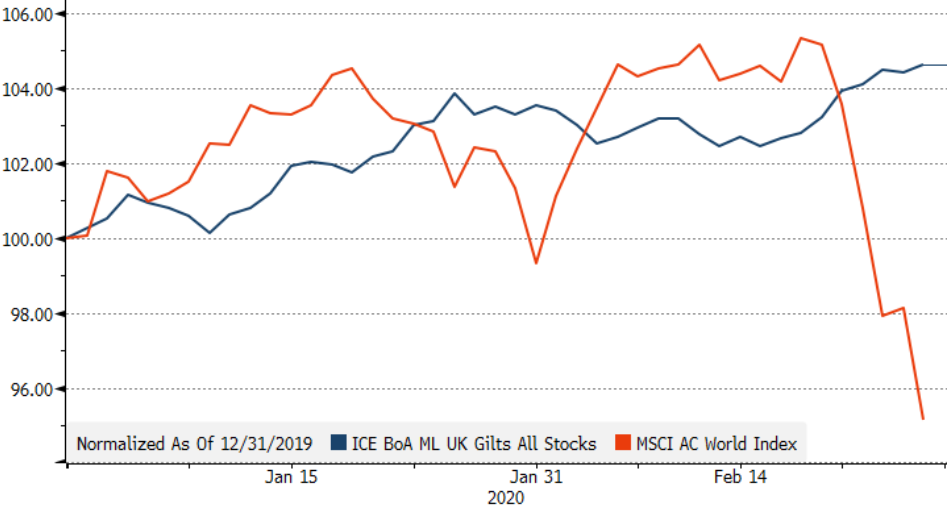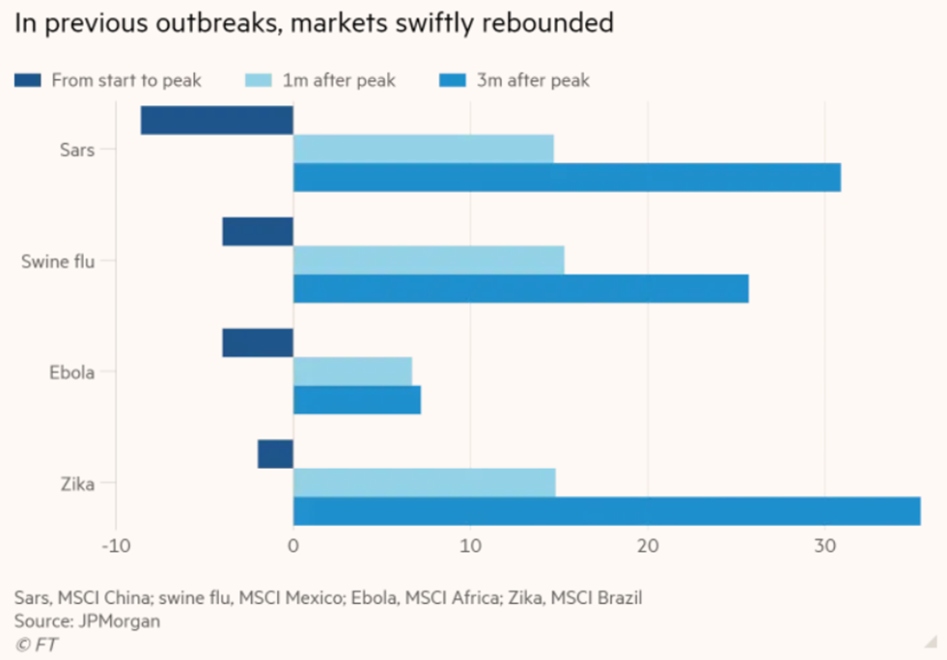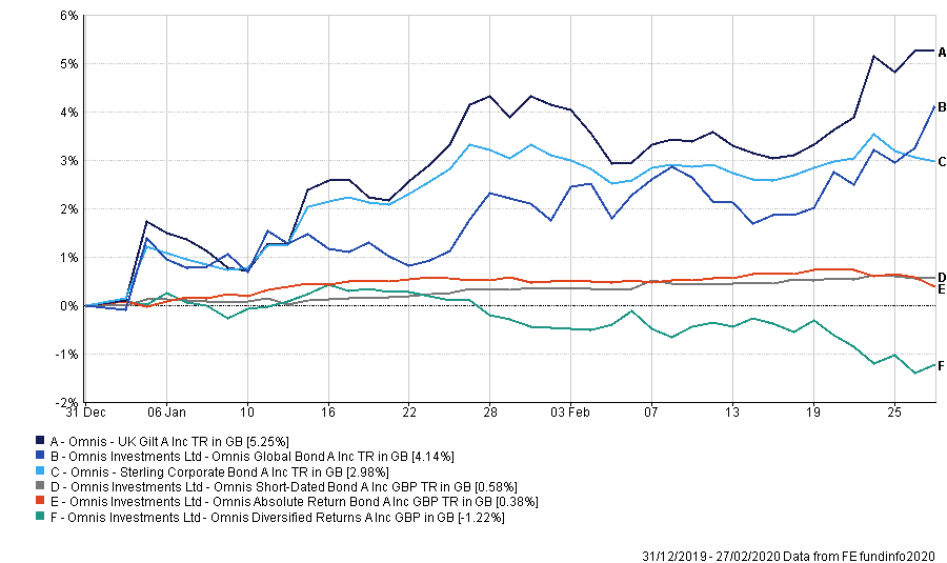FACED WITH THE THREAT OF THE CORONAVIRUS, INVESTORS HAVE ENGAGED IN A ‘FLIGHT TO SAFETY
Friday 28th of February 2020.
Following its emergence in central China in mid-January, the coronavirus has now been reported in 56 different countries. Of the more than 83,000 confirmed cases, nearly 3,000 have proved fatal. Though the rate of new infections in China has stabilised, and though the proportion of patients recovering has improved, the international spread of the virus has caused a great deal of alarm. As workers, shoppers and tourists stay home – either by choice or by government edict – expectations for economic growth and corporate profits have been revised downwards.
This has prompted sharp movements in global financial markets. As measured by the MSCI All Countries World index, global equities had, by yesterday’s close (27th February) fallen close to 10% from their peak in sterling terms. Thus far, stock markets have continued their downward march today, with Asian markets down c.3% and, at the time of writing, European markets following suit. By some measures, this has been the worst week for global equities since the depths of the financial crisis in 2008.
In market terms, the past week can be characterised as a ‘flight to safety’. Investors have sold riskier assets, such as stocks, and bought ‘safe haven’ assets such as high-quality government debt, including UK gilts.
Figure 1: While stocks have fallen, safe haven assets – such as gilts – have made gains

Source: Bloomberg, 31stDecember 2019 to 27th February 2020, returns in GBP
Exposure to gilts and other lower risk assets has therefore offered a degree of protection against the worst of the equity market falls. Our investment principles stress the importance of diversification: all OMPS portfolios include some exposure to these lower risk assets.
Exposure to lower risk assets is primarily attained through the bond and alternative funds in the Omnis range. These funds have held up well through the market turbulence.
As expected, the Omnis UK Gilt fund – which is invested entirely in UK government debt – has benefited the most from the flight to safety. The Omnis Global Bond fund has benefited both from its exposure to US government debt – often referred to as the world’s “risk free” asset – and to the US dollar and Japanese yen which are typically perceived as ‘safe haven’ currencies.
Meanwhile, the performance of the Omnis Sterling Corporate Bond has performed well as, despite investing in corporate rather than government debt, only high-quality bonds issued by robust companies are held in the portfolio.
Omnis bond and alternative funds have held up well through the market turbulence
Source: Financial Express Analytics, 31st December 2019 to 27thFebruary 2020, returns in GBP
Among the alternative funds, the Omnis Absolute Return Bond and Omnis Short-Dated Bond have performed as intended, eking out positive returns and doing so while keeping day-to-day fluctuations to a minimum. Though the Omnis Diversified Returns fund has fallen a little, losses have been around a tenth of those experienced by equity investors. Again, the fund has performed as expected, boosting portfolio diversification and helping shield investors from the worst of the stock market losses.
While the less risky parts of client portfolios have performed well throughout the recent market turbulence, they will not have offset all the losses from the riskier, equity-focused exposure. This is particularly true for Adventurous investors, where equity accounts for the vast majority of portfolios. Nonetheless, we would encourage investors to remember another of our investment principles: the benefits of staying invested for the long-term.
While the spread of the coronavirus is certainly unnerving – from both health and investment perspectives – it is not entirely without precedence. Though different in terms of geography, scale and contagiousness, we can look at market reactions to previous viral outbreaks to give us a sense of what to expect this time around. Typically, viral outbreaks have initially pushed stock markets lower. However, once the spread of the virus has been contained, stock markets have gone on to recover these losses and more.
Stock markets have recovered quickly from the initial impact of previous viral outbreaks

Finally, it is worth remembering that, as uncomfortable as the recent stock market movements have been, they are well within the range of short-term movements that equity investors should expect. Encapsulating the principles of diversification and long-term investing, the Graphene portfolios are designed to whether such turbulence in line with investors’ agreed attitude to risk.
Though the temptation to join the ‘flight to safety’ is understandable, history suggests it would be the wrong thing for investors to do. Historically, investors have been rewarded for trusting in the benefits of diversification and staying invested for the long-term. We do not expect the outbreak of the coronavirus to be the exception that proves the rule.
Colin Gellatly
Deputy Chief Investment Officer,
Omnis Investments
This update reflects Omnis’ view at the time of writing and is subject to change.
The document is for informational purposes only and is not investment advice. We recommend you discuss any investment decisions with your Openwork financial adviser. Omnis is unable to provide investment advice. Every effort is made to ensure the accuracy of the information but no assurance or warranties are given. The value of your investment and any income from it can fall as well as rise and you may not get back the original amount invested. Past performance is not a guide to future performance.

Please note: by clicking this link you will be moving to a new website. We give no endorsement and accept no responsibility for the accuracy or content of any sites linked to from this site.